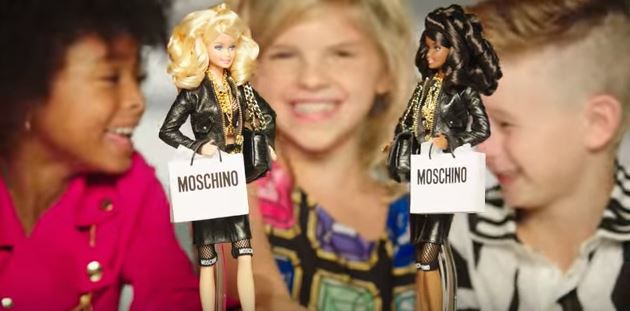
NASHVILLE (BP) — Mattel’s Moschino Barbie commercial featuring for the first time a boy playing with the doll could help normalize gender confusion and distort God’s intended image of humanity, experts in gender identity issues and ministry to those experiencing same-sex attraction told Baptist Press.

“The ad is a symptom of so many things that have gone wrong in our world and are affecting children, such as children growing up without fathers, the breakdown of marriage, the blurring of gender roles and hyper-sexualized media,” Johnston told BP. “I’m very concerned by this push to feminize boys. The commercial normalizes and celebrates gender confusion: boys acting and talking like girls.”
Bob Stith, Southern Baptist gender issues expert and founder of Family and Gender Issues Ministries in Southlake, Texas, also sees the advertising approach as a negative, and believes parents should not buy their sons toys that are “clearly feminine.”
“Male children can certainly be drawn to things that are considered more feminine,” Stith told BP. “They may be more artistically inclined, more sensitive. This is not a bad thing. The danger is when we as a culture encourage that child to pursue a feminine identity.”
Johnston agreed.
“We don’t want to be overly rigid in labeling toys as ‘boys’ or ‘girls.’ Children should have some flexibility and freedom in their play,” Johnston said. “However we do want to guide our children towards the truth that boys and girls are different. Those differences are good and worth celebrating; God built them into us at creation.”
The advertisement in question features a boy with a haircut similar to that of Moschino clothing line creative director Jeremy Scott. The initial batch of 700 copies of the doll sold out within an hour of its launch on Net-a-Porter Nov. 9 for $150 each, Scott posted on Instagram, and the doll was selling on secondary markets for $400-$800 each, the Christian Science Monitor reported. Scott is featured in Out Magazine’s Out100 2015 list.
“Moschino Barbie is so fierce,” the preteen boy says in the commercial with two girls, as he places a tiny black and gold purse on the doll’s arm. He then places a tiny black cellphone to the ear of the doll, who is wearing color-coordinated black and gold clothing. “It’s for you Moschino Barbie,” he says, winking his eye.
Both Johnston and Stith noted the boy in the ad is presented as effeminate. Stith pointed specifically to the boy’s mannerisms, voice inflections, and even the little wink at the end.
Johnston said, “The boy is clearly intended to look like a younger version of the man who designs the Moschino line of clothing…. Moschino has a history of wading into dark, highly sexualized territory, and Mattel’s partnership with this designer takes the toy company there, too.”
The designer Scott “is gay identified, believes that fashion should be ‘transgressive’ and has designed highly sexualized clothes for men and women,” Johnston said. “This is not a good model for children.”
Gender confusion led to his own same-sex attraction, Johnston said, who is now married and the father of three sons.
“Gender confusion was a factor in my own struggle with homosexuality and is a factor for many men and women with same-sex attractions, behavior and identity,” he said. “We shouldn’t be fostering this confusion in children.”
Stith said the issue with the ad is not the abandonment of “gender stereotyping,” but rather “abandoning gender identity” in a culture also bent on eliminating gender distinctions.
“It seems clear also that many today think that it is ultimately helpful to a child to affirm him or her if they manifest tendencies that are not generally considered to be consistent with their biological gender,” Stith said. “This ultimately adds to a child’s confusion rather than lessening that confusion. It has contributed to a culture that seeks to convince the world that it is harmful — and even evil — to seek to help a child grow into his true gender identity, but it is a good thing to give them drugs and ultimately surgically mutilate them.”
Children have to be taught to grow into the men and women God intended, the experts noted.
“Parents should gently steer these boys toward a healthy sense of masculine identity and toward relationships with other boys and men,” Johnston said. “Fathers and male role models are critical here; they help the boy leave the world of women and enter the world of men.
“Churches and families can be a huge factor in teaching God’s design for humanity, relationships and marriage,” he said. “God made us male and female in His own image, and blurring those distinctions distorts God’s image in us.”
In today’s culture, Stith said, it is more important than ever for churches to learn how to encourage children to accept their biological gender identity.
“We must understand and teach that there is nothing inherently wrong with a male child who is sensitive and/or artistic,” Stith said. “He may have no interest in hunting or playing sports. That doesn’t determine gender identity. I am also not too concerned with very young boys playing with dolls. This can help them learn and express tenderness. But this should not be what they play with exclusively and it shouldn’t be long term.”
Stith referenced a previous Baptist Press first-person article on gender identity, written by Ricky Chelette, executive director of Living Hope Ministries in Dallas. The article offers several parenting tips on connecting with sensitive boys.
“After all is said and done, it still comes down to the truth that God created them male and female,” Stith said. “Regardless of what culture says and does we must never compromise on that truth.”















